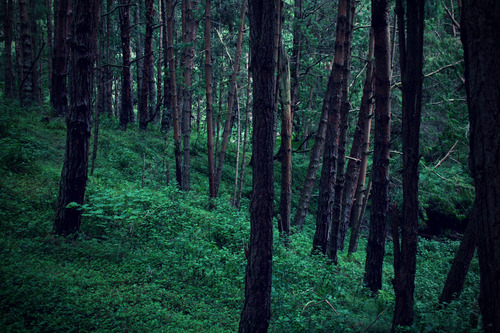When Lila can’t recognize where she is, she attributes it to the acid. She recognizes that much at least, that everything is not as it should be, that her surroundings exist only in her drug riddled head, and not in the world her body inhabits. Everything is green, a green that is too bright to be real, the green of cold Northern forests warmed by summer light. A forest road that she walks on twists and turns every which way it wants and throws her off into the undergrowth. She sprawls there, rolls over on her back and listens to the high calls of the meadowlarks, drinking in the sun, feeling lost and bewildered. Where is he, she wonders, where is the man who was walking by her side just moments ago, wheeling along his bike, the basket holding a hamper for a midsummer picnic? Maybe he never was there, she realises. He hasn’t been there for years now, yet he walks by her side when she loses touch with her senses, as he would walk by her side when he loved her in another lifetime. Pain she calls him, his name is Pain and Misery, Privation and Deprivation, she tells herself, yet he is all the men her life never gave her.
Lila can’t remember her parents, or siblings, even when she is sober. Misery is all the men who should have been there for her, guided her, been patient with her, taken care of her, and listened to her – rolled into one. Misery gives up on this early on and Lila responds by systematically and meticulously etching patterns into her skin with a skewer she found at med school, bleeding into the bedspread, the mattress, the shower, delighting in the pain, waiting for it to leach out of the grooves she just opened up on her wrists and her groin, her forearms, thighs and belly. Lila is never seen out of her collection of full sleeved breton tops and tapered cigarette trousers. She goes from olive to pasty to fishbelly pale, the scars raising blinding white and garnet grooves all over her body. “Find me someone,” she tells Misery one day when he falls in love with Lila’s successor. But he never has the chance to respond. The next day Lila meets The Man.
The first time she sees him, he is sitting in a chair on a deck, under a white parasol, sipping coffee. He looks old, tired and haggard, with a lined face and thinning hair. Lila is entranced. She wonders if he will agree to cut her. She sits on the floor of the deck, hugging her knees, smiling at him while he looks at her in amusement. He never sleeps with her – she screams the first time he touches her cunt and runs into the bathroom and only comes out after 2 hours of coaxing with a blood encrusted groin. Instead, he familiarises himself with the network of scars on her body, gently urging her to tell him the stories behind them and making up stories for the ones she can’t remember anything about or refuses to disclose the truth of. He has one scar, a huge ugly one that looks like a slug on his chest; he got it in a fight when he worked on a Japanese whaler. Or so he says.
Weaned away from the acid and the coke, Lila takes to weed like a natural pothead and starts eating 6 times a day. Slowly, her wizened body begins to fill out; the hollows of her collarbone and ribs become less harsh and her hair starts growing again. She spends all day in bed with The Man, smoking, eating, making out. They lead a placid life, renting a room in a house that looks like the house she thought she might have grown up in – wooden and rundown, covered in white crochet doilies and overrrun by girls. They are orphans, ranging in age from 5 to 15, the eldest, Rin, visibly jealous of what she perceives as Lila’s worldliness and range of sexual experience. Lila gives her all of her makeup, old and new, in an effort to make her happy; Rin chooses an orange lipstick and spends all day reapplying it in the bathroom mirror. The matronly supervisor of the foster home looks askance at Lila and The Man and threatens to not renew their contract next time if they keep on spending all day in their room smoking things that smell funny; Lila, high on weed, just smiles and offers her the banana bread she is stuffing with single minded concentration in her mouth.
One day, the orphans arrange to produce a play they wrote themselves, and the house is a bustle of activity. Old trunks and suitcases in the attic are dug out and looted for moth eaten treasures: faded brocades, lace so fine it disintegrates at the slightest touch, mouldy furs, and a sealskin cape that once would have been the pride of some woman’s wardrobe. With Lila’s help, the older orphans fashion garments vaguely resembling togas from a trunk filled with cream silk and initialled A.E. The play itself is amateurish but the children are delighted at their handiwork – at the stage fashioned out of wooden planks, broken chairs and holey brocade, and at the array of lemon and chocolate cookies Lila has baked for them. She sits on the front seat with The Man, clapping enthusiastically and remembering to not notice the fumbled lines every 5 minutes or so. She holds his hand and realises that it has been one year since the day she was tripping in the woods, that it is midsummer again, and afterward there will be sparklers and strawberry cake and music. That night when he holds her tight in bed, kissing her breasts in the dimming blue light of the gloaming, she urges his head towards her cunt.
Later, she dreams of running away with him, running into trains and over hedges and across fields, till they see the valley stretching out in front of them, green as green can be, dipping fantastically in front of their eyes, spreading ever onwards till the snowy mountains on the horizon where they want to be. “Let’s go there,” she tells The Man, taking his callused hand in her bony one. “I’m not afraid; let’s go.” They start walking.




